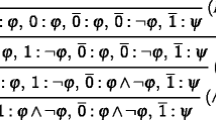Abstract
We recapitulate (Section 1) some basic details of the system of implicative BCSK logic, which has two primitive binary implicational connectives, and which can be viewed as a certain fragment of the modal logic S5. From this modal perspective we review (Section 2) some results according to which the pure sublogic in either of these connectives (i.e., each considered without the other) is an exact replica of the material implication fragment of classical propositional logic. In Sections 3 and 5 we show that for the pure logic of one of these implicational connectives two – in general distinct – consequence relations (global and local) definable in the Kripke semantics for modal logic turn out to coincide, though this is not so for the pure logic of the other connective, and that there is an intimate relation between formulas constructed by means of the former connective and the local consequence relation. (Corollary 5.8. This, as we show in an Appendix, is connected to the fact that the ‘propositional operations’ associated with both of our implicational connectives are close to being what R. Quackenbush has called pattern functions.) Between these discussions Section 4 examines some of the replacement-of-equivalents properties of the two connectives, relative to these consequence relations, and Section 6 closes with some observations about the metaphor of identical twins as applied to such pairs of connectives.
Similar content being viewed by others
References
van Benthem, J. (1991): The Logic of Time, Kluwer, Dordrecht (Second Edn.; First Edn. 1983).
Bignall, R., Spinks, M. and Veroff, R. (15–18 June, 2005): ‘On the assertional logic of the generic pointed discriminator variety’, presented at the conference Algebraic and Topological Methods in Non-Classical Logics II, Barcelona.
Blamey, S. and Humberstone, L. (1991): A perspective on modal sequent logic, Publications of the Research Institute for Mathematical Sciences (Kyoto University) 27, 763–782.
Blok, W. and Pigozzi, D. (1989): Algebraizable logics, Memoirs of the American Math. Soc. 77, #396.
Byrd, M. (1973): Knowledge and true belief in Hintikka's epistemic logic, Journal of Philosophical Logic 2, 181–192.
Casanovas, E., Dellunde, P. and Jansana, R. (1996): On elementary equivalence for equality-free logic, Notre Dame Journal of Formal Logic 37, 506–522.
Czelakowski, J. (2001): Protoalgebraic Logics, Kluwer, Dordrecht.
Font, J. and Hájek, P. (2002): On ukasiewicz's four-valued modal logic, Studia Logica 70, 157–182.
Gardner, M. (May 1978): The Bells: Versatile numbers that can count the partitions of a set, primes, and even rhymes, mathematical games column, Scientific American 239 (5), 24–30.
Gödel, K. (1986): On intuitionistic arithmetic and number theory, pp. 287–295 in S. Feferman, J. W. Dawson, S. C. Kleene, G. H. Moore, R. M. Solovay and J. van Heijenoort (eds.), Kurt Gödel: Collected Works, Vol. I, Publications 1929–1936, Oxford University Press. (Article originally published in German in 1933.)
Gottwald, S. (2001): A Treatise on Many-Valued Logics, Research Studies, Baldock, Herts.
Hintikka, J. (1962): Knowledge and Belief: An Introduction to the Logic of the Two Notions, Cornell University Press, Ithaca, NY.
Humberstone, L. (1986): A more discriminating approach to modal logic (Abstract), Journal of Symbolic Logic 51, 503–504.
Humberstone, L. (1986): Extensionality in sentence position, Journal of Philosophical Logic 15, 27–54; also ibid. 17 (1988), 221–223, The Lattice of Extensional Connectives: A Correction.
Humberstone, L. (1997): Singulary extensional connectives: A Closer Look, Journal of Philosophical Logic 26, 341–356.
Humberstone, L. (2000): An intriguing logic with two implicational connectives, Notre Dame Journal of Formal Logic 41, 1–40.
Kabziński, J. (1982): Basic properties of the equivalence, Studia Logica 41, 17–40.
Krolikoski, S. (1979): Łukasiewicz's twin possibility functors, Notre Dame Journal of Formal Logic 20, 458–460.
Łukasiewicz, J. (1970): A system of modal logic, Journal of Computing Systems 1 (1953), 111–149. Reprinted in L. Borkowski (ed.), Jan Łukasiewicz: Selected Works (pp. 352–390), North-Holland, Amsterdam.
Prior, A. (1967): Logic, many-valued, pp. 1–5 in Vol. 5 of P. Edwards (ed.), Encyclopedia of Philosophy, Collier-Macmillan, New York.
Quackenbush, R. (1974): Some classes of idempotent functions and their compositions, Colloquium Mathematicum (Soc. János Bolyai) 29, 71–81.
Rautenberg, W. (1989): A calculus for the common rules of \(\wedge\) and \(\vee\), Studia Logica 48, 531–537.
Scott, D. (1974): Completeness and axiomatizability in many-valued logic, pp. 188–197 in L. Henkin et al. (eds.), Procs. of the Tarski Symposium, American Math. Society, Providence, Rhode Island.
Segerberg, K. (1982): Classical Propositional Operators, Clarendon, Oxford.
Smiley, T. (1962): The independence of connectives, Journal of Symbolic Logic 27, 426–436.
Spinks, M. (2000): A non-classical extension of classical implicative propositional logic (Abstract), Bulletin of Symbolic Logic 6, 255.
Spinks, M. (2002): Contributions to the Theory of Pre-BCK-Algebras, Doctoral Thesis, Gippsland School of Computing and Information Technology, Monash University.
Spinks, M. (2003): On BCSK logic (Abstract), Bulletin of Symbolic Logic 9, 264–265.
Vármonostory, E. (1992): Generalized pattern functions, Algebra Universalis 29, 346–353.
Williamson, T. (1998): Iterated attitudes, pp. 85–133 in T. J. Smiley (ed.), Philosophical Logic (= Procs. British Academy 95), Oxford University Press, Oxford.
Zolin, E. (1999): Completeness and definability in the logic of noncontingency, Notre Dame Journal of Formal Logic 40, 533–547.
Author information
Authors and Affiliations
Additional information
An erratum to this article is available at http://dx.doi.org/10.1007/s10992-007-9046-2.
Rights and permissions
About this article
Cite this article
Humberstone, L. Identical Twins, Deduction Theorems, and Pattern Functions: Exploring the Implicative BCSK Fragment of S5 . J Philos Logic 35, 435–487 (2006). https://doi.org/10.1007/s10992-005-9023-6
Published:
Issue Date:
DOI: https://doi.org/10.1007/s10992-005-9023-6
Key Words
- BCK-algebras
- connectives
- consequence relations
- deduction theorem
- implication
- modal logic
- pattern functions
- translational embeddings



